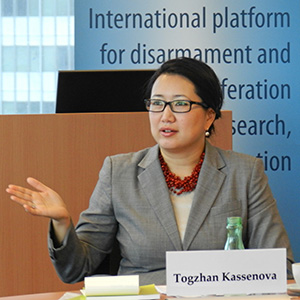

On 1 July 2014, the Vienna Center for Disarmament and Non-Proliferation (VCDNP) hosted a seminar on Brazil's peaceful nuclear program by Dr. Togzhan Kassenova, an associate in the Nuclear Policy Program at the Carnegie Endowment for International Peace. VCDNP Executive Director Elena Sokova moderated the event.
Dr. Kassenova presented the key findings of her new report, "Brazil's Nuclear Kaleidoscope: An Evolving Identity." Brazil is pursuing independent, full nuclear fuel cycle capabilities, which has raised concerns among some states. The report title reveals that, according to the author, many pieces must be considered in the context of Brazil's nuclear policy, including historical changes and developments. By exploring various angles, her research attempts to provide a better understanding of Brazil's nuclear choices and to enable a broader and more objective discussion on the Brazilian nuclear program.
In her presentation, Dr. Kassenova focused on components of Brazil's nuclear policy: Brazil's past, its role in the global nuclear order, the nuclear power sector, and the nuclear submarine program.
"Negative past experiences help explain why Brazil seeks nuclear independence," Dr. Kassenova asserted. In her opinion, past problems with obtaining nuclear technology and fuel supply from abroad encouraged Brazil to develop domestic nuclear fuel cycle capabilities. According to Dr. Kassenova, Brazil also views nuclear technology as an instrument for achieving international recognition. Regarding Brazil's alleged past attempts at nuclear weaponization, Dr. Kassenova relayed the findings of Brazilian historians that while the military offered Brazil's top leadership "a weaponization option" in the 1970s, such a program never received a "green light" to proceed.
According to Dr. Kassenova, Brazil perceives the global nuclear order as unfair and unsustainable, reflected, for example, in the inequality of state parties to the Treaty on the Non-Proliferation of Nuclear Weapons. "For Brazil, the nuclear order is a microcosm of the world order," she said. Consequently, Brazil is concomitantly frustrated with the global nuclear order but wants to be at the table among the leading world powers. According to Dr. Kassenova, many Brazilians see nuclear independence as a way for the country to enhance its status in the current global order.
As Dr. Kassenova pointed out, Brazil's energy sector largely depends on hydro-resources. 80 percent of the country's electricity is provided by hydropower and only 3 percent is produced by nuclear energy. She discussed the "internal debate [in Brazil] on whether to expand the nuclear energy sector, with supporters of this approach on the one side and strong voices against it on the other." Further tensions exist between the nuclear industry—which is eager to develop the national nuclear fuel cycle—and the government, which "allows the nuclear sector to develop, but [...] does not openly support nuclear power."
Regarding Brazil's nuclear submarine program, she argued that there is a different view about this topic from inside the country. Outside Brazil, the discussion is characterized by two themes: its proliferation risk and its apparent senselessness. Within the country, strategic and defense rationales justify its nuclear submarine program: to protect the coastlines, to protect the off-shore oil resources, to prevent uncertain threats in the future, and to stave off potential aggressors. However, Dr. Kassenova argued, these reasons cannot fully explain the submarine program. In her opinion, navy bureaucratic interests are one of the main driving forces behind the program, which "represents a stable source of funding and is also technologically interesting. But above all," she continued, "Brazilians believe the submarine program helps their country to strengthen its position in the world politics and promote technological independence."
In conclusion, the author stated, in order to understand Brazil's nuclear program, one must consider the various domestic drivers—including historical ones—behind its nuclear policy decisions.